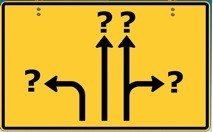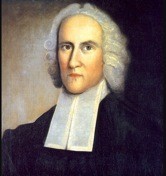 What is my purpose in life? This is a question that plagues each and every one of us. The Westminster confession puts the question this way: "What is the chief and highest end of man?"
What is my purpose in life? This is a question that plagues each and every one of us. The Westminster confession puts the question this way: "What is the chief and highest end of man?"
Countless books and blogs have addressed this question. But are we really asking the right question?
So often our life and our theology can be very self-focused. You may remember Carly SimonŌĆÖs song ŌĆ£YouŌĆÖre so vain, you probably think this song is about you.ŌĆØ Many of us could rewrite it to say, ŌĆ£YouŌĆÖre so vain; you probably think this life is about you.ŌĆØ Often we spend so much time contemplating ŌĆ£myŌĆØ purpose in life that we fail to recognize that life is not about us. What is life really about? God!
So the question we should really be asking is not ŌĆ£What is MY chief and highest end?ŌĆØ but ŌĆ£What is GODŌĆÖs chief and highest end?ŌĆØ
Scripture and the great theologians who have gone before us resoundedly agree: "The chief and highest end of God is HIS GLORY."
│ę┤Ū╗ÕŌĆÖs glory is a predominant theme in Scripture, being mentioned no less than 77 times. Yet, how many recent sermons, bible studies, lectures, or conversations have centered on │ę┤Ū╗ÕŌĆÖs glory? This may be in part because our tendency to read Scripture as a self-help book rather │ę┤Ū╗ÕŌĆÖs book. Even when we do acknowledge that God is the main focus of Scripture, we can still come away feeling a bit uncertain about what exactly is │ę┤Ū╗ÕŌĆÖs glory.
Jonathan Edwards on │ę┤Ū╗ÕŌĆÖs Glory
The great American theologian, Jonathan Edwards, helps shed some light on │ę┤Ū╗ÕŌĆÖs glory. Edwards saw the very purpose of preaching as giving the listener the opportunity to know and respond to this very GLORY of God.
 In Ultimate End for which God Created the World, he describes │ę┤Ū╗ÕŌĆÖs glory on earth as: ŌĆ£the emanation and true external expression of God's internal glory and fullness.ŌĆØ
In Ultimate End for which God Created the World, he describes │ę┤Ū╗ÕŌĆÖs glory on earth as: ŌĆ£the emanation and true external expression of God's internal glory and fullness.ŌĆØ
This definition, helps point out that here on earth we lack a perfect synonym for │ę┤Ū╗ÕŌĆÖs glory. The only sufficient definition of │ę┤Ū╗ÕŌĆÖs glory is │ę┤Ū╗ÕŌĆÖs glory itself. When we look at Scripture, we see │ę┤Ū╗ÕŌĆÖs glory includes EVERYTHING about GodŌĆöboth in his transcendence and in his immanence. Alongside │ę┤Ū╗ÕŌĆÖs glory, Scripture places his goodness, justice, honor, love, beauty, radiance, eternality. All that God isŌĆöis glorious.
Jonathan Edwards further explains that:
┬Ę God in his very essence is glorious.
┬Ę │ę┤Ū╗ÕŌĆÖs actions in creation are glorious
┬Ę God gave us the ability to perceive his glory & worship him for it.
┬Ę God gave us the ability to tell others of his glory.
ŌĆ£Show me your glory.ŌĆØ Exod. 33: 18
We can see all 4 of these dimensions in , which comes right after the Israelites have made the golden calf and rejected the living God who brought them out of Egypt. Due to their sin, the Israelites have lost the privilege of being in │ę┤Ū╗ÕŌĆÖs presence. Instead of focusing on himself, when Moses intervenes for his people he asks God: ŌĆ£Show me your glory.ŌĆØ
The Lord graciously responds by letting his ŌĆ£goodnessŌĆØ pass before Moses as he protects him in a cleft of rock on Mt. Sinai (). We can learn from this passage:
1. │ę┤Ū╗ÕŌĆÖs very essence is glorious. Out of his protecting, loving mercy, God actually shields Moses from seeing his glorious face, ŌĆ£for man shall not see me and liveŌĆØ ().
2. │ę┤Ū╗ÕŌĆÖs very actions in creation are glorious. God tells Moses that he is ŌĆ£slow to anger and rich in unfailing love and faithfulness ... forgiving ... and does not leave sin unpunished.ŌĆØ ().
3. The proper response to │ę┤Ū╗ÕŌĆÖs glory is worship. After seeing │ę┤Ū╗ÕŌĆÖs back, Moses bows his head and worships God. He then shares with the Israelites │ę┤Ū╗ÕŌĆÖs regulations on how to worship him. (, )
4. We are to proclaim │ę┤Ū╗ÕŌĆÖs glory. God calls Moses and the Israelites to proclaim his glory to all the nations by living by │ę┤Ū╗ÕŌĆÖs established covenant.
For Moses, this experience was enough to go and lead the nation of Israel. He knew he could trust in God's providence, mercy, faithfulness, love, and justice. Remember MosesŌĆÖ face after this experience? It was so radiant that the Israelites were afraid to come near him ().
Response to │ę┤Ū╗ÕŌĆÖs Glory: Worship & Proclamation
That leads us back to observation: ItŌĆÖs not about me, itŌĆÖs about God. We, like Moses, are made to radiate │ę┤Ū╗ÕŌĆÖs glory. puts it this way, ŌĆ£whether you eat or drink or whatever you do, do it all for the glory of God.ŌĆØ The latter two dimensions of │ę┤Ū╗ÕŌĆÖs glory help us know how to live out our chief and highest end: The proper response to │ę┤Ū╗ÕŌĆÖs glory is worship and proclamation.
 Today we are called, like Moses, to be like the moon when it is lit by the sun. As Christians, we are not light itself, just as the moon does not produce its own light. Instead our purpose is to reflect the SonŌĆÖs light. When we seek our own glory, we are taking from God what is rightfully his. This has been a temptation since the Garden of Eden. God has revealed himself by his Word and Spirit. In Christ, we can truly know and draw close to God in his glory. Though we do not see him in his full glory (for like Moses that would be too much), we can see enough of him for our lives to radiate his glory. The only appropriate response is to, like Moses, worship God and to proclaim his glory to the nations. That is our very purpose.
Today we are called, like Moses, to be like the moon when it is lit by the sun. As Christians, we are not light itself, just as the moon does not produce its own light. Instead our purpose is to reflect the SonŌĆÖs light. When we seek our own glory, we are taking from God what is rightfully his. This has been a temptation since the Garden of Eden. God has revealed himself by his Word and Spirit. In Christ, we can truly know and draw close to God in his glory. Though we do not see him in his full glory (for like Moses that would be too much), we can see enough of him for our lives to radiate his glory. The only appropriate response is to, like Moses, worship God and to proclaim his glory to the nations. That is our very purpose.
 ║┌┴Ž└·╩Ę
║┌┴Ž└·╩Ę

.jpg)

